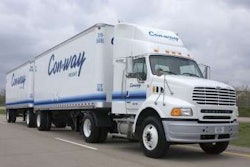A federal appeals court on Friday, April 3, threw out a $2.4 million judgment against Werner Enterprises on the grounds that the closing arguments presented by the plaintiff’s lawyer – much of it in the form of an imaginary letter from Werner to the children of the injured automobile driver – were improper. The U.S. Court of Appeals for the Tenth Circuit ordered a new trial in the case, which stemmed from a December 2003 crash in Oklahoma involving a Werner driver-trainee. The jury had assessed damages at $3.2 million with Werner being 75 percent responsible.
“Counsel spent the bulk of his argument placing before the jury fictitious admissions never uttered by defendants and launching vituperative and unprovoked attacks on defendants and their counsel,” the appeals court ruled. “Neither line of argument was appropriate.” Werner’s counsel had objected at the time, but the district judge had overruled those objections.
At the close of trial, plaintiff’s counsel presented a closing argument in which he asked the jury to “imagine” with him that, shortly after his client had left the house the night of the accident, Werner delivered a letter to his children. The imaginary letter, as recounted to the jury, begins, “That was the last time you will ever see your dad as you now know him.” The letter goes on to place the plaintiff’s version of events and the conduct of the trial as if Werner itself had presented them in the fictitious letter.
The appeals court said that its job “is not to grade closing arguments, but it is to police the outer boundaries of permissible argument.” The appeals court said the plaintiff’s counsel exceeded the permissible limit by referring extensively to evidence not in the trial record and “flooded his argument with abusive references to his opposing party and counsel.”
For example, plaintiff’s counsel used the fictitious letter to introduce a number of prejudicial invented admissions by Werner regarding the experience and performance of the driver-trainee and driver-trainer, the appeals court said. “The invented facts placed before the jury were also plainly calculated to arouse its sympathy, evoking, as they did, images of plaintiff’s children receiving for the first time news of their father’s injuries, implicitly asking the jury to place themselves in the shoes of the children, and portraying Werner as repeatedly admitting to reckless conduct.”
The closing argument “at least subtly, if not overtly, placed before the jury the suggestion that Werner acted with a degree of calculated intentional malevolence – a suggestion that had no foundation in this trial on negligence,” the appeals court ruled. In addition, about a quarter of the closing argument was devoted to attacks on Werner and its counsel “that likewise had no basis in evidence adduced at trial,” the court said.
The appeals court said the decision to order a new trial was based on three factors – the extensiveness of the improper remarks, the failure of the judge to grant any relief during trial and the size of the verdict.
For a copy of the appeals court’s decision, which includes the text of the plaintiff counsel’s imaginary letter, click here.











